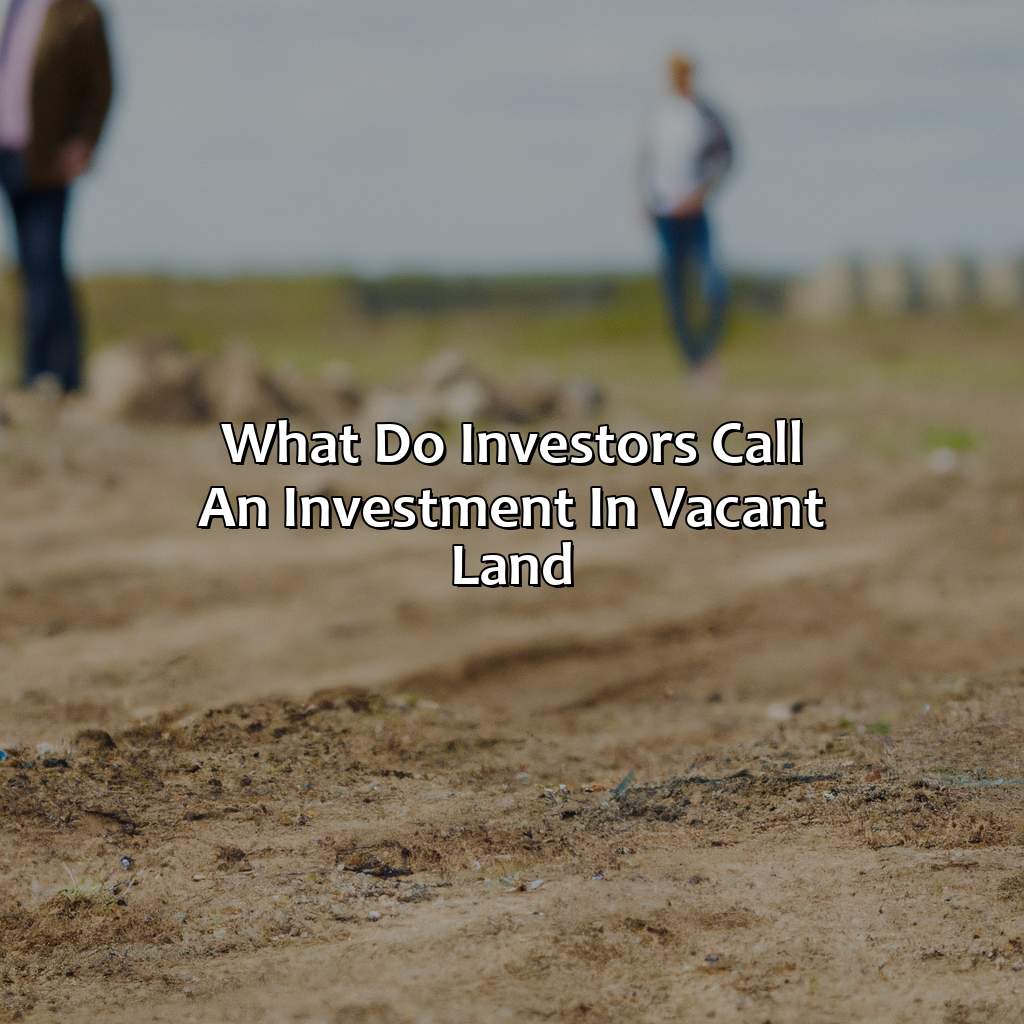What Do Investors Call An Investment In Vacant Land?
Key Takeaways:
- Investment in vacant land is referred to as land banking and involves purchasing undeveloped land for future development or resale potential.
- Vacant land investments can include agricultural, residential, and commercial types, each with its own potential for profitability and risks.
- Advantages of investing in vacant land include a low cost of entry, minimal maintenance, and potential for high returns, while risks include zoning restrictions and market volatility.
Are you seeking new investment options? Investing in vacant land can provide a great return if done strategically. You can discover what investors call this type of investment and how it can benefit you.
Definition of vacant land
Investors consider vacant land as a piece of property that doesn’t have any buildings or other structures on it. This type of land is often undeveloped and isn’t being used for any specific purpose. When investors put their money into vacant land, they typically do so with the expectation that the value of the property will increase over time. Some investors may plan to build on the land in the future, while others may simply be speculating on the property’s potential value.
Investing in vacant land can be lucrative, but it also comes with its own set of challenges. For example, vacant land can be difficult to develop, especially if it isn’t zoned for the intended use. Additionally, it may be hard to find buyers for the land if the market isn’t favorable or if the land doesn’t have desirable features like scenic views or convenient location.
Despite the challenges, there are success stories of investors who have profited from investing in vacant land. One such example is the case of a couple who purchased a piece of undeveloped land in a growing suburb. They held onto the property for several years and eventually sold it for a substantial profit when demand for housing in the area increased. This is just one example of how strategic investment in vacant land can pay off.
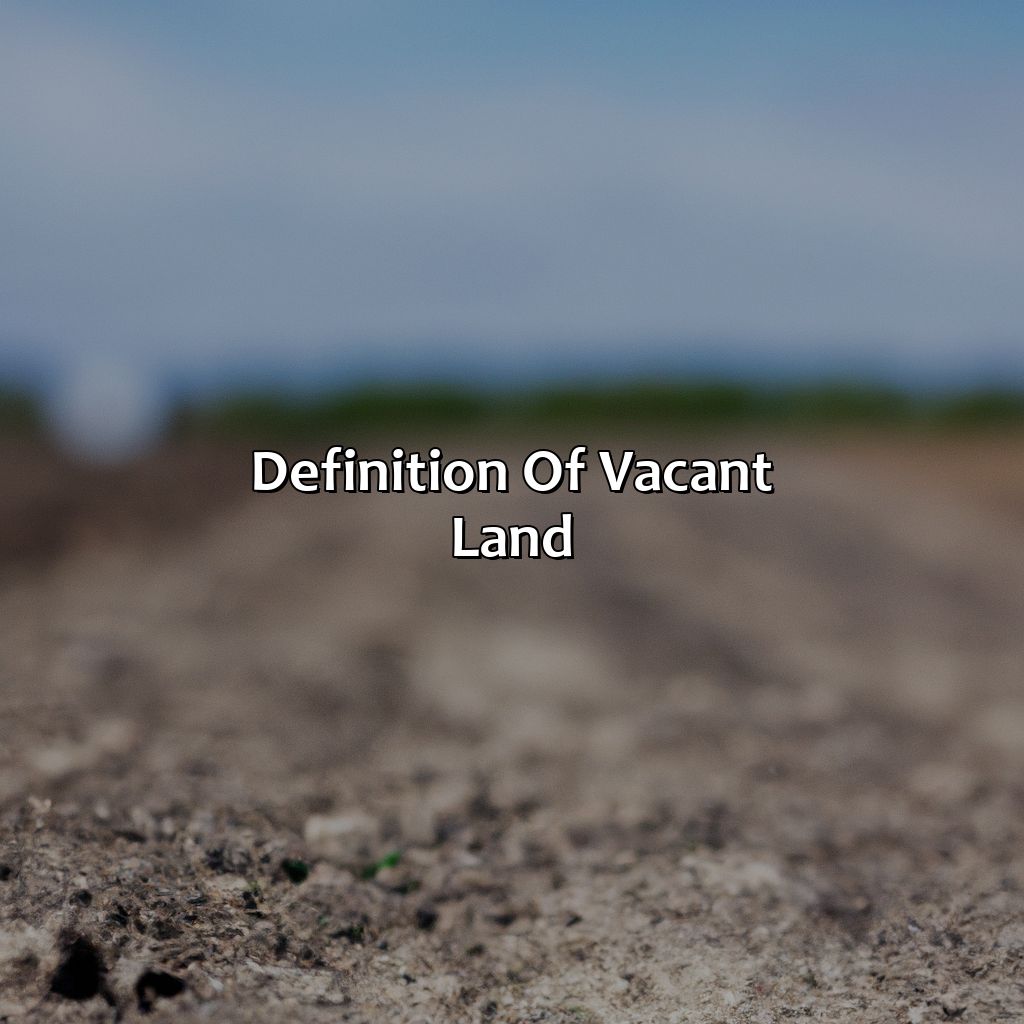
Image credits: retiregenz.com by James Arnold
Why invest in vacant land
Vacant land investment – a wise choice?
Investing in vacant land is a profitable option for investors. The growth potential and long-term value of the property make it appealing to those with a long-term investment plan.
Moreover, one of the benefits of vacant land investment is that it requires minimal maintenance and upkeep. Unlike rental properties or commercial real estate, investors do not have to worry about dealing with tenants, regular repairs, or utility bills.
Another advantage is the flexibility that vacant land investment offers. Investors can choose to hold onto the property for a longer period until the value appreciates, or they can develop the land for a higher return on investment.
It’s worth noting that vacant land investments may come with some risks. These risks include zoning and environmental restrictions, accessibility, and market demand which can negatively impact the value of the property.
To minimize the risks, investors can consider purchasing properties with good road connections, excellent water availability, and low restrictions. Moreover, investors may also engage experts in understanding environmental restrictions and market demand to ascertain value-added opportunities.
Investing in vacant land offers investors a potential for consistent growth, flexibility, and low maintenance. Careful consideration, research, and guidance from experts can significantly increase the chances of success in this venture.
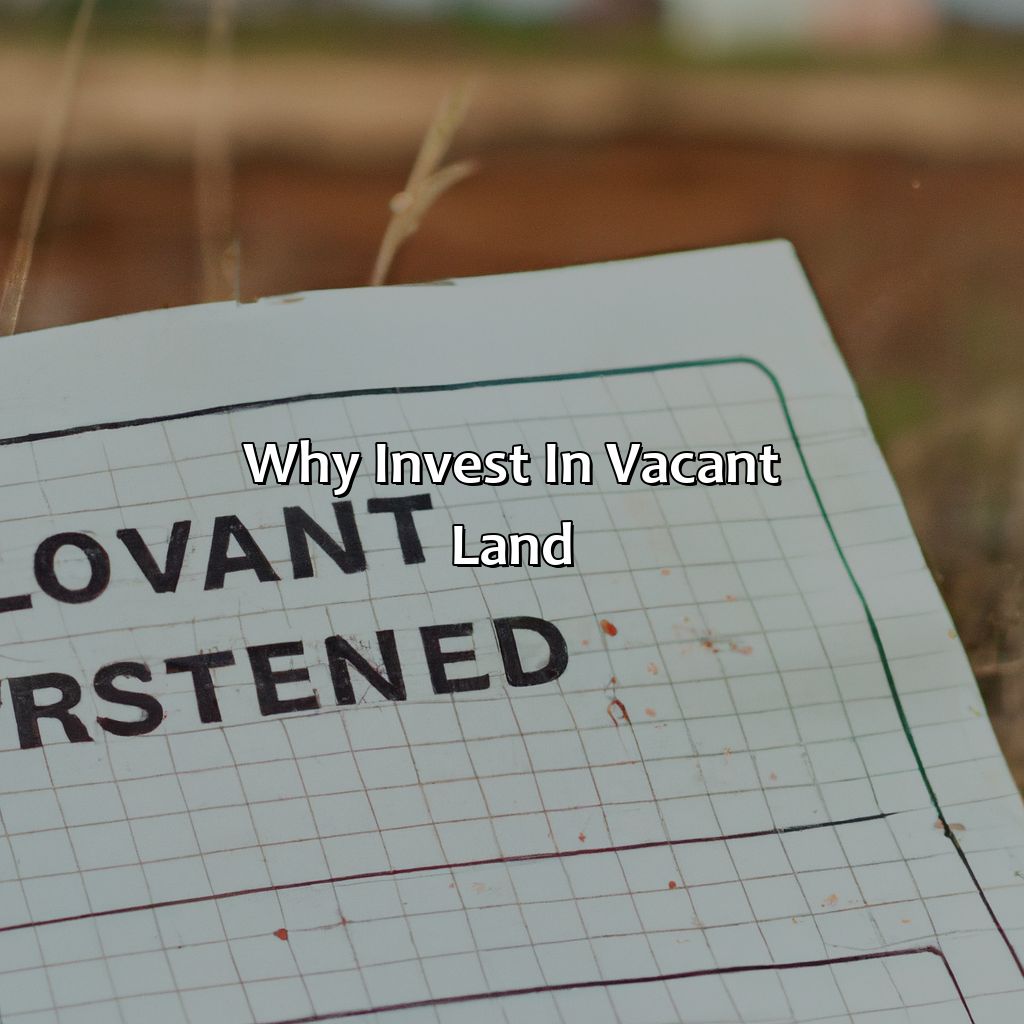
Image credits: retiregenz.com by Adam Washington
Types of vacant land investments
Investing in vacant land? Get the scoop on the different types! Look at agricultural, residential, and commercial land – these are the sub-sections we’ll cover. Dive into this section called “Types of vacant land investments” to find what you’re searching for.
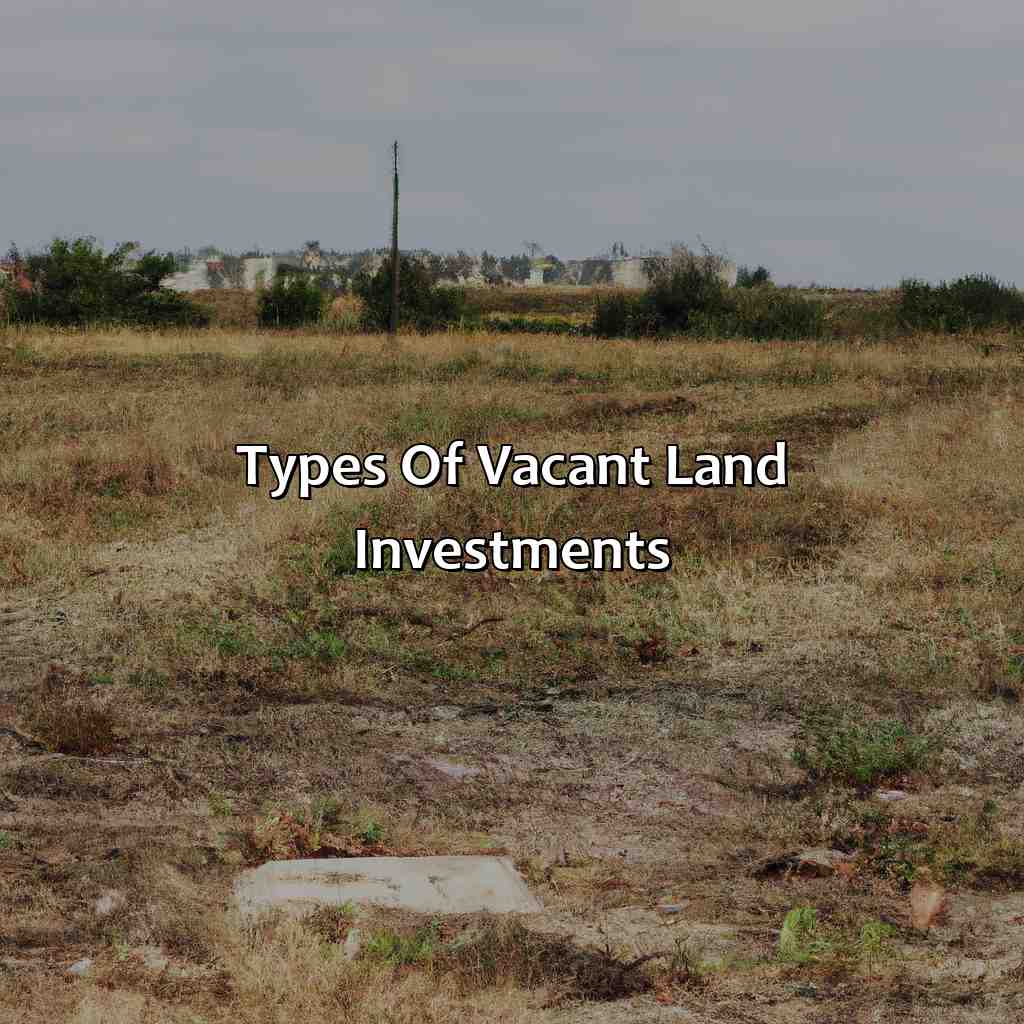
Image credits: retiregenz.com by Adam Duncun
Agricultural land
Investing in undeveloped agricultural land can bring higher returns on investment in the long run. The value of farmable land increases over time, making it a worthwhile investment for patient individuals. Agricultural land is often purchased as a long-term investment for farming, grazing or crop cultivation purposes.
An investment in this type of vacant land requires due diligence to ensure there are no easements, restrictions, or environmental concerns that could impact future use. Investors must also have knowledge of the soil quality and climate to determine its potential uses.
Agricultural lands provide many benefits to investors such as non-cyclical nature with less volatility and ability to offer tax benefits in some regions. Notably, investing in agricultural land decreases overall market risks and enables investors to hold on assets that will retain their tangible intrinsic value for years.
According to a report from USDA, “Farmland provides food for America’s families and exports abroad while supporting nearly 21 million American jobs across related industries.”
Buying residential land is like getting a Tinder match – you’re excited about the potential, but you never know if there will be a connection.
Residential land
Investing in real estate typically involves buying a piece of land or property that holds potential for appreciation and value. When it comes to residential land, investors may be interested in purchasing a plot of raw land with the intention of building one or multiple homes on it. Residential land can also refer to lots within established neighborhoods that have yet to be developed. These investments are often viewed as long-term, with potential gains coming from the development or sale of the property.
Beyond the basic understanding of residential land investments, there are several types that investors may consider. For example, some investors prefer to focus on infill lots – plots of land within existing neighborhoods that have remained undeveloped due to various reasons such as zoning issues or unique neighbor structures. Others may look for high-end residential properties, such as beachfront properties, where demand is high and prices continue to rise.
When investing in residential land, it’s important to conduct thorough research beforehand. This includes looking at market trends and forecasts for the area, zoning regulations and restrictions, potential environmental hazards like flood zones or soil contamination, and overall development potential. By being diligent in their research and making informed decisions based on data and analysis, investors can maximize their return on investment.
Pro Tip: Consider partnering with a local real estate agent or developer who has experience in the market you’re interested in investing in. Their expertise can help guide your decision-making process and increase your chances of success.
If buying commercial land was easy, everyone would be a real estate tycoon instead of just a font of 5-letter words for Scrabble.
Commercial land
Investing in undeveloped parcels of land for the primary purpose of obtaining income generation is what investors term ‘Commercial real estate.’ Real estate developers and investors buy commercial land either with a planned proposal (developing it into facilities), or to lease, resell, or hold onto until the value rises. Investing in commercial property can be more profitable than investing in residential property because commercial properties usually provide higher rental yields. Additionally, with regards to zoning regulations and location, the market value of commercial property is determined by extensive research due to demand and supply factors.
One common type of investment in commercial land is buying properties that are already leased out. This strategy guarantees an immediate cash flow return on investment for buyers without any further modifications required. The lease provides income over time while providing more control over how the premises will be used and managed. In contrast, vacant land investment allows investors to create custom developments that satisfy specific needs while having complete control over the process.
Furthermore, investing in commercial real estate requires a lot of capital up front but comes with high returns if done wisely. For instance, IBM initially purchased all the lots where its headquarters now stand in New York City 30 years before they even built anything on them. They waited patiently until the surrounding area was developed well enough so that their properties would yield a high return on investment upon constructing new buildings there.
In summary, investing in vacant lands calls for financial clarity along with thorough analysis about business prospects which come from owning such valuable assets. Nonetheless, by picking strategic locations such as prime areas where development is expected to occur soon offers great potential for long-term capital gains and positive cash flow generation alike. Buying vacant land is like buying a blank canvas, except instead of painting a masterpiece, you’re building a fortune.
Advantages of investing in vacant land
Investing in vacant land has many benefits. Low cost of entry, minimal maintenance and potential for high returns. Learn more! It’s a smart choice for first-time investors or those looking to increase their portfolio. Sub-sections below will explain more.
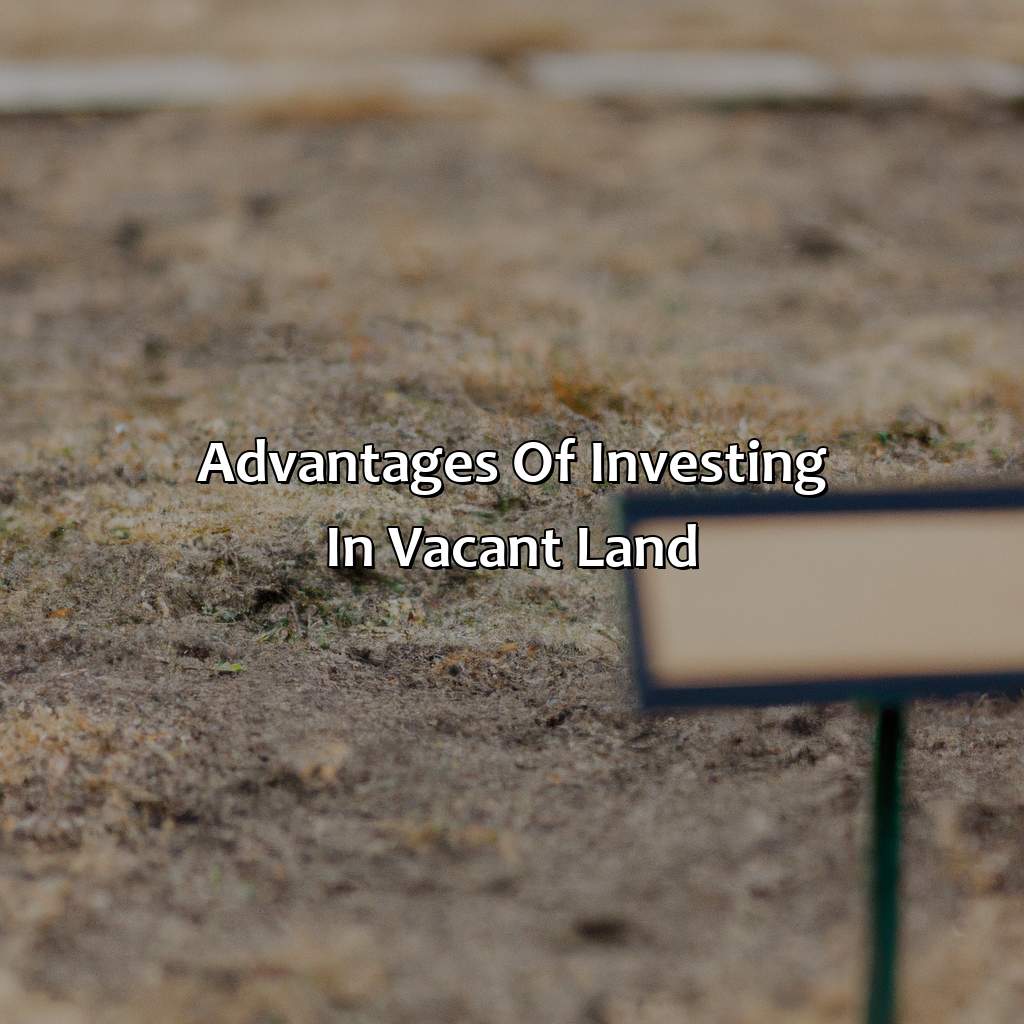
Image credits: retiregenz.com by James Woodhock
Low cost of entry
Vacant land is a lucrative investment option owing to its low cost of acquisition. With limited upfront funding, you can acquire an extensive plot of land to keep as a long-term asset or develop for profit. Plus, the absence of any structural improvements on vacant land eliminates maintenance fees and expenses.
Moreover, investing in vacant land means no property taxes are due until construction begins, eventually reducing investment costs. You can also purchase it outrightly or obtain financing with minimal scrutiny, unlike other real estate investments that require tons of documentation and loan evaluations.
In addition, location is paramount while purchasing vacant lands; choosing locations that are accessible and possess development potential maximizes its value and return on investment. Thus, research adequately before dipping your feet into such investments.
Own a piece of land and enjoy the luxury of not having to worry about mowing the lawn or fixing leaky faucets.
Minimal maintenance
Investing in vacant land has an advantage of requiring minimal upkeep. Unlike other real estate investments, that demand consistent maintenance, vacant land doesn’t have any buildings or infrastructure to maintain, decreasing the investor’s workload and expense. As a result, investors can hold onto their investment for extended periods without worrying about their real estate properties’ maintenance costs.
Moreover, by holding onto vacant lands without constructing anything on them, investors can avoid expenses related to insurance coverage and property taxes. With no tenants or buildings to manage and fewer regular costs associated with its maintenance. An investment in vacant land ensures more income on returns in the long run.
Vacant lands are immune to damage resulting from tenancy disputes, lease expiries or eviction problems encountered with other properties such as rental properties. Additionally, investing in undeveloped land guarantees better privacy and security over dealing with tenants or vandalism cases.
According to FORBES Magazine (2019), investing in undeveloped land stores value over time, increasing the potential for capital gains and wealth accumulation. Therefore, purchasing a lot of non-income producing land located near planned urban sites may increase profitability given how cities expand along likely patterns of growth through time.
Buying vacant land is like playing the stock market, but with less risk and more dirt.
Potential for high returns
Investing in an unoccupied parcel of land could lead to lucrative returns. This investment opportunity offers unique benefits that are not available with other traditional investments such as stocks or bonds. With the correct market analysis and profit-generating strategies, an investor could potentially gain exponential returns on their investment in vacant land.
Expanding on this, investing in undeveloped land grants investors the potential to create their development opportunities. One way is through building rental properties or commercial real estate on the plot, thereby gaining residual income from lease arrangements. Another strategy would be buying land in up-and-coming areas where developers are likely to construct infrastructure, increasing property values. With a proper plan and adequate research, the potential for high returns is virtually limitless.
Investing in vacant land isn’t only advantageous but has also proven to be profitable through history. For Instance, Some years ago, American fast-food chain McDonald’s purchased a piece of unused land strategically located along a freeway junction before it was established as prime commercial territory. The acquisition turned out to be an excellent decision when it later sold the site at a substantial markup price.
Who needs roller coasters when you can invest in vacant land? The thrill of the ups and downs is just as real.
Risks of investing in vacant land
Investing in vacant land can be risky. Zoning restrictions and market volatility can cause complications. To understand this better, keep reading!
Sub-sections will give you insight into:
- Zoning laws
- Effects of markets on land selling
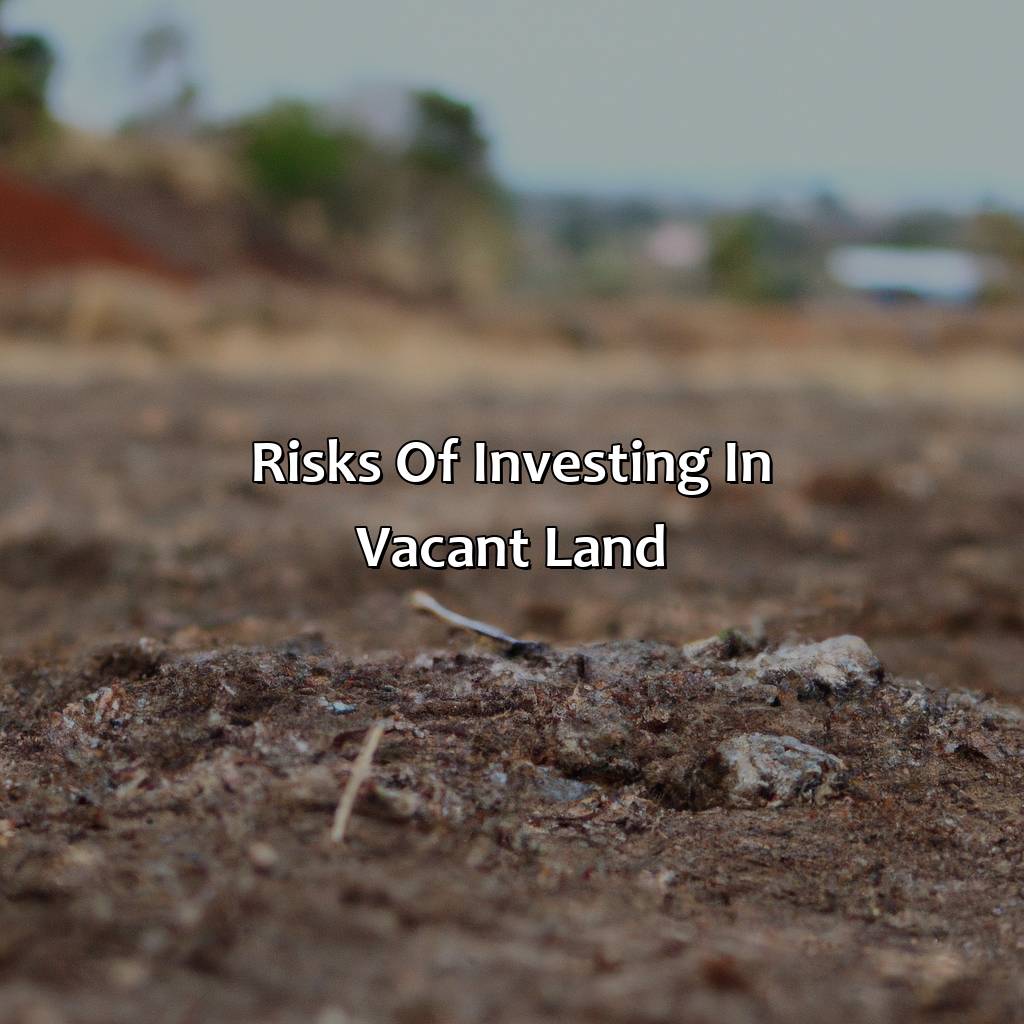
Image credits: retiregenz.com by Joel Arnold
Zoning restrictions
When investing in vacant land, it’s essential to consider the zoning laws of the area. These laws restrict the type of construction allowed on specific lands based on their intended use, such as residential, commercial, industrial or agricultural zones. It is important to ensure that any plans for developments align with zoning restrictions to avoid legal issues and project delays.
Furthermore, investors should examine the regulations at federal, state and local levels before investing in a specific location. Though federal regulations provide broad guidelines for land usage, state regulations impose specific requirements that vary from location to location. Hence, investors must be familiar with these restrictions when making investments in vacant land.
Investors find it helpful to consider hiring a consultant or an attorney specializing in zoning restrictions and analysis of possible implications. Such experts can help scrutinize details that may affect investment returns without hassle.
A survey conducted by Zillow Research found that over 20% of US land has restrictive zoning regulations allowing only single-family homes to be built. Source: https://www.zillow.com/research/zoning-restrictions-across-us-20135/.
Investing in vacant land is like playing the stock market during market volatility – it’s a risky gamble with no guaranteed return.
Market volatility
The uncertainty in the real estate market in recent years has resulted in unpredictable fluctuations, commonly known as investment insecurity. The unpredictability of factors like demand, location and pricing can lead to volatile market conditions. This instance may result in investors who purchase vacant land receiving low returns on their investment.
Furthermore, vacant lands provide opportunities for construction projects depending on size and topography, but this might come with necessary permissions from local government officials. Investors should also consider environmental factors such as natural disasters during the purchase process.
It is essential to research available data which includes demographic and economic changes before investing in vacant lands. Conducting surveys of the immediate surroundings, proposed zoning laws and general infrastructure are key steps to providing a better insight into future demand trends.
Investigators at Deloitte have reported that understanding banking markets has played a critical role when making safe investments in unoccupied land.
Five Facts About Investments in Vacant Land:
Investment in vacant land can be a long-term strategy for capital appreciation and potential returns. (Source: Investopedia)
Vacant land can be used for various purposes such as agriculture, recreation, or commercial development. (Source: The Balance Small Business)
Investing in vacant land often involves lower maintenance costs compared to other real estate investments. (Source: Land Century)
Location and zoning regulations play a crucial role in determining the value of vacant land investments. (Source: Fit Small Business)
Investing in vacant land can provide a hedge against inflation and economic uncertainties. (Source: Millionacres)
FAQs about What Do Investors Call An Investment In Vacant Land?
What do investors call an investment in vacant land?
Investors typically refer to an investment in vacant land as a raw land investment.
What are the benefits of investing in vacant land?
Investing in vacant land can offer several benefits, including low purchase prices, no maintenance costs, potential for appreciation, and the ability to use the land for various purposes.
What types of investors typically invest in vacant land?
Vacant land investments are typically popular among long-term investors who are looking to diversify their portfolios. These investors may include individuals, corporations, and even governments.
How can I find investment opportunities in vacant land?
You can find opportunities for vacant land investment through real estate agents, online listings, auctions, and networking with other real estate investors.
What are some factors to consider before investing in vacant land?
Before investing in vacant land, it is important to consider factors such as zoning regulations, access to utilities, and potential environmental issues.
What are some potential risks of investing in vacant land?
Some potential risks of vacant land investment include property taxes, zoning changes, environmental remediation costs, and decreased demand for the land.It is always recommended to consult with an experienced real estate attorney before making any investment decisions.
 Checkout this IRS Loophole
Checkout this IRS Loophole 
